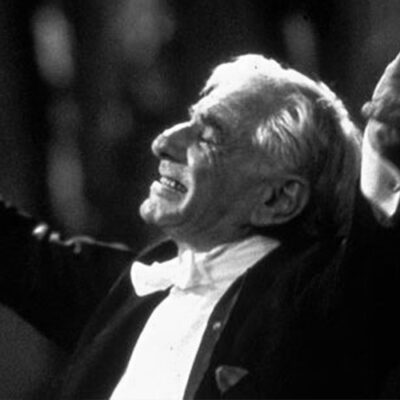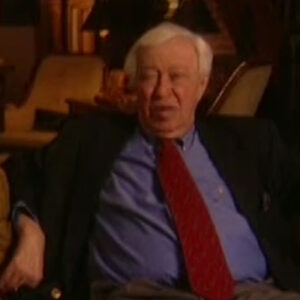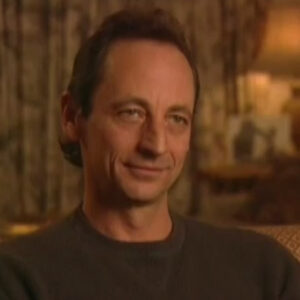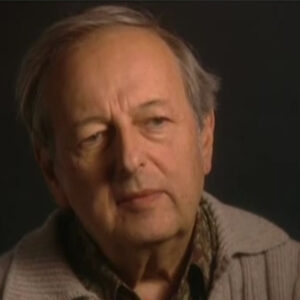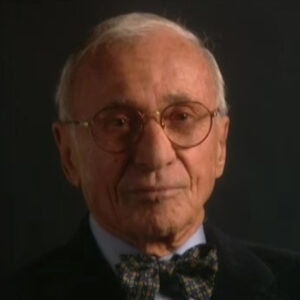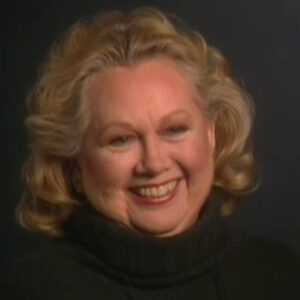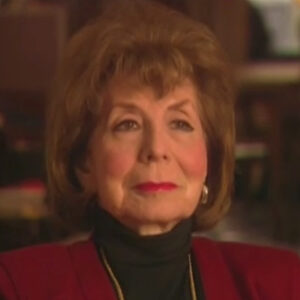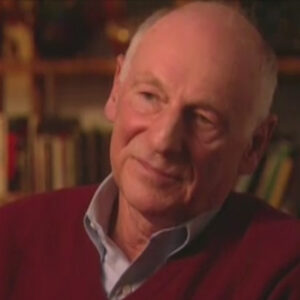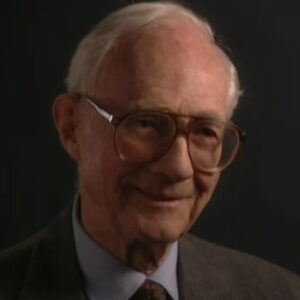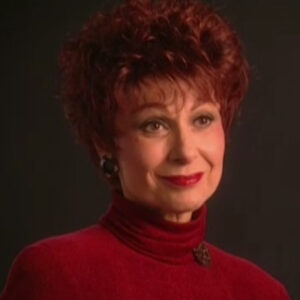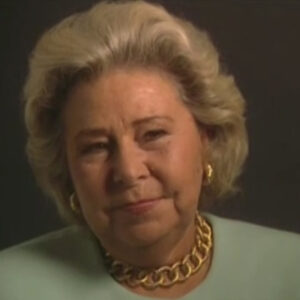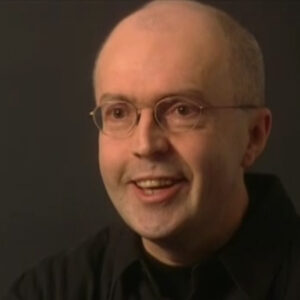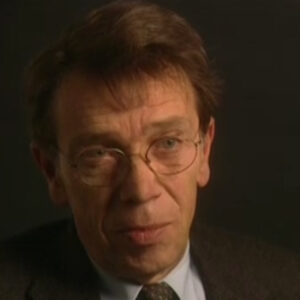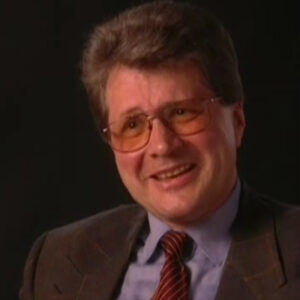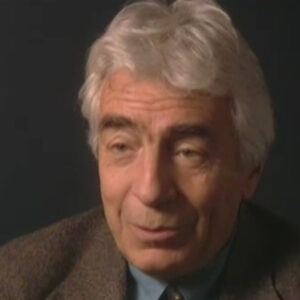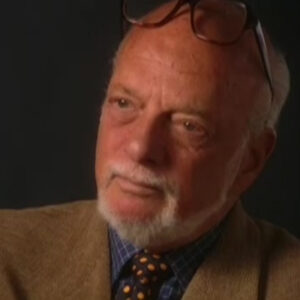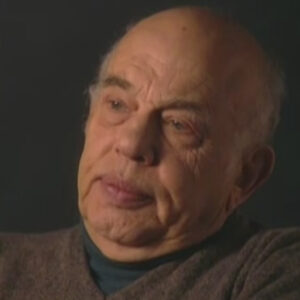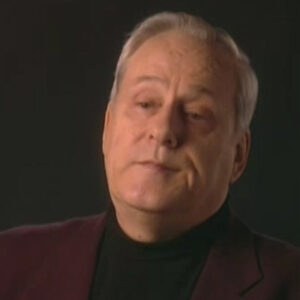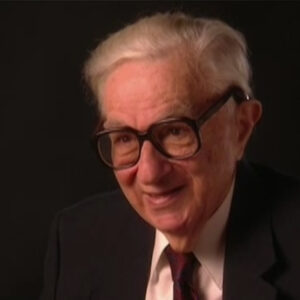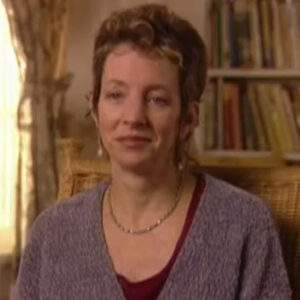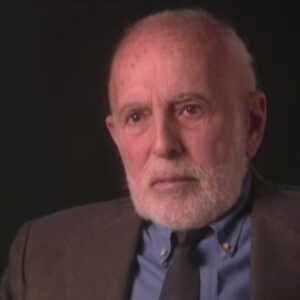Speaker I started working for Leonard Bernstein in January 1986. I was called his assistant musical assistant, various titles like that. And one of my main functions was to make sure that he was at rehearsals, performances and functions on time and ready to go. This was not always the easiest thing to do. And I remember my first traveling assignment was to pack up everything and go to Vienna, where he was going to conduct for the first time his opera, a quiet place at the Vienna State Opera. A quiet place is a very personal opera to him and almost autobiographical in some ways. And I was sort of a big, big challenge for him. But it was also a large challenge for me, because up until that point in my life, I traveled with one suitcase being a relatively modest human being. I was not used to traveling with everything he owned in the Dakota. And by the time we got through hacking up, I mean, it wasn’t like he packed everything, but I went over it with his former assistant and we had 25 suitcases of various sizes and I wouldn’t call them suitcases. I would call them trunks. And besides the necessary materials for his conducting his tales, which most people think, our conductor has one set of tales. Well, not Leonard Bernstein, because it would be impractical. He needed at least we traveled usually with a dozen set of tails. He would travel with rehearsal clothes galore because he went through clothes in a rehearsal. Like most people go through water because after every break, he would need to change because like everything else, he was completely he put his complete life into rehearsal and he had a tendency to sweat. And the other things he liked to travel with were his books. He was a voracious reader and he had a certain set of books that he liked to travel with and starting with the Torah and the Bible. He was a deeply spiritual man. And I don’t know if people know that. I mean, you can hear it in his music and you can hear it in his writings. But he always had the Torah and the Bible next to his bed. And then he had Alice in Wonderland, which he always traveled with, and the Oxford Book of Poetry, The Complete Works of William Shakespeare. And probably the 10 novels that he was going to read on this trip, which a page was never turned, and various crossword puzzle books, which everybody knows he loved crossword puzzles by now and all the magazines that he hadn’t quite gotten to. So we had a trunk just of books, and then he had his complete desk supplies and photographs that he took. And it was interesting arriving in Vienna because the room had been completely arranged to his specifications, which I believe Harry had organized with the hotel beforehand. And he had a beautiful daughter, seven foot piano, a desk, a dining table. And this was a suite. And it was like walking. And it had the same feeling as the Dakota. And everywhere we went around the world, he had to create this sense of stability in home because he traveled quite extensively throughout the year and he always had a habit of returning to the same hotel suite, the same hotel, because it made him feel give him a sense of security to have the same people on the staff at the hotel. It was not unlike coming back to the Dakota where his family and his, you know, loyal and dedicated housekeeper was always there waiting for him. And I think this gave him a certain foundation from which to create and to conduct and give his best in each of these cities. Traveling with learning was also extremely a great deal of fun. Often we would be the last ones on the plane, plane and on the jet. And he never liked to be the first. So it was always just trying to get him to the airport. And he was always started going through an airport because people did recognize him. I think he enjoyed that immensely. And we would get on the plane and it would just go crazy. And many times he would run into friends that he had met. I remember one time he ran into Johnny Carson and they had a great time talking slowly not they didn’t really talk. They had a great time. I mean, he ran into Johnny Carson and Johnny Carson was sitting in the seat in front of us. And Mr. Carson greeted Mr. Bernstein. And it was very cordial and landing, I believe. Ask Mr. Carson about his wife and Mr. Carson and just recently divorced his wife. So it was rather an embarrassing moment.
Speaker But we proceeded after that to play a word game, as Lenny would often do to make these flights more enjoyable. And we just tried to write down every word that every name that began with Jesse and I’ll let you carjacked and where we started and. And then other great moments of traveling the planet were one time he decided he wanted to drive the car, much to my chagrin, we were going to a concert and felt so awesome in northern north of Bavaria on the Czech border, and he wouldn’t let the chauffeur drive.
Speaker And we drove. And driving with Lenny was a harrowing experience. And I believe anybody who’s ever ridden with him would tell you this because he had more he had better things to do. He had to conduct. He had to sing and play word games. And watching the road was a very complicated such thing. It’s amazing that he never had an accident because I’d seen my life. Life flashed before my eyes many a time when I was in the writers side of the car.
Speaker But we arrive in this very small town and all of a sudden he just keeps on driving. And slowly the car stops against the wall and he says, we’re here. It was great fun and.
Speaker And those are some stories about traveling with Lenny when you were traveling with Mitt Romney, talk about what was going on in his life, how he felt about where he was going to be because he opened.
Speaker Reveal himself. Oh, when we were traveling alone, like going up to Fairfield or Tanglewood or on an airplane or flying lunch, and I would often have, you know, HEART-TO-HEART conversations, he was a very loving and caring man. He was very concerned about my life, making sure that I was happy and he would share about his private life with me about what was going on with his friends and his family. I don’t feel comfortable bridging that trust or conversation, but we did talk about personal matters and he was always a very fine counselor and always gave great advice and was always very concerned about his friends and his family. Was most important to him. But as always, in his life, I think his family was the most important thing to him besides music and making music and composing. I think he had a great deal of love for his family and he was concerned about what the future would bring for them. And I always got this great sense from him that his family was number one music, of course, and then his friends and more friends than we could ever imagine. And he cared about every single person and every musician in the orchestra. He would get personally involved if he had to to help somebody. He was a very loving man.
Speaker So generous. I would say generosity was his greatest trait. I mean, he gave so much of himself and you see this in rehearsal tapes. You see this in performance. You see this in his relationships with other people. And sometimes probably he gave more and didn’t keep enough for himself.
Speaker You know, it was hard for him to balance that, I think, because he wanted to he was such a loving man and he wanted to be good for everybody. From the composition of the.
Speaker What if goals were worked where composing music sat in? Points in his life sentence. Well, I think to talk about his last years as a composer, we must look at the works that he composed first. And the time I worked with him, he completed a major orchestra piece called Concerto for Orchestra. He completed Arias and Bardwell’s, which is a duet for it started out as four singers have ended up in two singers, piano four hands. He worked very hard on a work with Jonquiere and John Wells, which never completely came together, but he worked on it. He wrote piano pieces, he wrote other songs, and I’m missing something else, he wrote. I can’t recall what it was, you know. Do you have a list of. Why do this matter? I actually feel that this is almost as if there was a sense of time running out there, and that’s what I’m trying to get. Where where was he in terms of what was he seemed to begin to make different kinds of choices about? At this time, OK, so when we talk about Mr. Bernstine in the last few years of his life as a composer, I think it’s important to look at the number of works that he composed and how prolific he was. He wrote a major orchestra piece. It was commissioned by the Israel Philharmonic. It started off his Jubilee games. And then he added three more movements to it and he called it Concerto for Orchestra to work. That should be revisited because it’s actually a marvelous work. He wrote Arias and Bach roles, which is a major song cycle for began for for singers and piano duet, which he played premier and actually with Michael Tilson Thomas at the keyboard. And it’s now it’s just for two singers and a piano duet. It’s a major song cycle. He wrote Missa Brevis, which is a small mass, which is wonderful. He worked for a long time, about a year, I believe, with Jonquiere, and I believe it was Gregory Mosher on revisiting a work, a bricklayer that they were working on. He published 13 anniversaries for piano. I’m proud to say one of them is for me and and he was working very hard on composing. I think he was a little not a little.
Speaker I think he was concerned like he had been all his life and he didn’t have enough time for composing. I think this was a great struggle in his his life as an artistic and creative person because he both liked to perform and he both like to compose. And there, too, I feel two different distinct personalities or composers of solitude demand solitude. And it’s a lonely occupation, actually. You go and lock yourself in to the studio in Fairfield and you stare at a blank piece of paper and you wait for the muse where conducting you have you’re interacting with all these wonderful musicians. You have an audience and it’s a it’s a group. He he’s I think he referred to it once as a great love in. So for a man who loves humanity, I think composing may have been a very difficult.
Speaker Difficult work and may have been very difficult, and I think that’s one reason why he often used collaborator’s, that’s why he enjoyed working so much with Betty Kamden, Adolph Green and and Candy. Just look at the numerous collaborators that were there. And I think towards the end of his life, he wanted to write more and more music, but time wasn’t on his side. This may be a good time to talk about the way to talk about all of you saw.
Speaker This is really the culmination of a lifetime. Can you talk to you about. I know you write much, but it’s still something that psychologically it’s very, very important.
Speaker One of the projects that he often spoke about was this Holocaust opera that he wanted to write. And he I believe he has some writings and sketches, not musical sketches. I think more libretto type sketches. I think he often search for a librettist. And I think he had a desire to talk about the 20th century. But I don’t know too much about this offer. But it was he often it was always back there in the back of his mind, in the back of his soul. And I think in a way, it was him trying to make sense of the 20th century. And I think in many ways that the subject for the four people he approached for collaboration was just too overwhelming and too personal.
Speaker And I think for him probably the same thing because it is not a pretty subject. And, you know, to immerse yourself in that kind of nightmare, I personally can’t imagine wanting to write an opera about it. But he did often talk about this project, but I don’t know how far he got along on it.
Speaker I really don’t know that much about it, that’s all I you know. Mood swings and we’re I’m I’m I’m trying to get used to that, you don’t want to say, but from his correspondence, it does he play.
Speaker As you realize, time probably was and how did that affect, you know, him? Oh, I did. I knew him since 76. Yeah, I met him. So what did you observe and how did you observe? What did you observe?
Speaker They like his personality and the person that well, when I first met Leonard Bernstein, he was still very much a hero figure to me, and I knew him before I worked with him in, you know, socially through Harry crowds and and through musical things. I sometimes did some music shopping for him and everything. And as I said, he was always a very polite and generous man. I, I bartended occasionally at his apartment when I was very young and I met a lot of the wonderful people in his circle. But when I started working for him, I realized what how deep a human being he was, how deeply spiritual, as I’ve said before, and in many ways had disillusioned he was with the human condition. And I think for a man as sensitive as he was, I think this was an extra burden. I mean, some people can look at the human condition and just say, oh, that’s the way it is. But I think it affected. He took it personally. He took the fact that certain ethnic groups couldn’t get along together personally. He felt for some reason responsible, and it caused him a great deal of pain. And I think this comes out in a lot of his music and in the loneliness.
Speaker And I think it definitely comes out in his performances of Mahler and Beethoven and the great works of the 20th century, Beethoven, great works of the 20th century like Mahler.
Speaker And he was also of, you know, a lot of fun to be with, too, when he was happy and surrounded by his family and his friends and just felt like he’d given the best concert of his life, which was every day, you know, everyone was better than the other day. He was just like a spark of freshness and fun, but was often in the mornings when I would arrive at the office and he’d be eating breakfast.
Speaker And he he was a very deep thinker and very affected by nature.
Speaker I remember one night coming back to the House that he was staying and Tanglewood, it was actually of the evening after his 17th birthday. It was very, very late. And I and another person drove him back to the house. And I believe it was a full moon. And we just he was just so overwhelmed by the beauty of a full moon. And that’s the kind of human being he was. He took he taught me to take in everything on a different level, to really look at the world, look at nature, to look at the person sitting across from you and and not just judge them immediately, but look into their soul and try and find the level in which you relate to them as another fellow soul. And his moods did swing and he would go up and he would go down. But he was a very sensitive person. And I feel that’s one reason why he had these mood swings. And it was very hard on himself. He demanded only the finest when it came to making music and being a creative artist from himself. And I believe that’s why some of his performances were the greatest in the world, because he made demands on orchestras, I wouldn’t say demands. He allowed the orchestras to be as great as they could be because he was demanding so much of himself. And they rose to that occasion. And it was he would be the first to say it was a mutual music making. He wouldn’t take all the credit for it when he talked about making music with the Vienna Philharmonic. You know, it was a shared experience as well as the other great orchestras and conducting. Heartfelt, sincere and.
Speaker Why do you think he was so. I have to start out to make a statement, right?
Speaker I believe many people misunderstood Leonard Bernstein because. Because he was so many so many different things to so many different people, and I believe in the our world of specialization when somebody isn’t easily pinpointed or isn’t fit, doesn’t fit into a category, if they become a threat or an enigma and it makes people it makes it hard for people to grasp grasp onto them or hold onto that person and therefore they’re uncomfortable. I mean, I know this in my own personal experience, but I think Lanny was misunderstood because of that. People couldn’t just say, oh, Leonard Bernstein’s a conductor or Leonard Bernstein’s and composer Leonard Bernstein makes serious music. Leonard Bernstein writes show music. Oh, he teaches to, you know. Oh, he studies, too. And he was just such a Renaissance man that it was very hard to get a handle on him. And I think people misunderstood that or didn’t want to see them. I don’t want to judge other people, but I think that might have been one reason why he was so misunderstood.
Speaker Did he ever hear I mean I mean, I cried. Even many people said this is true. You know, all I want is like the culmination of something to be done that I now.
Speaker Yeah, but how do you think he felt? Do you feel that you felt that he felt that you made the choices that.
Speaker I think Leonard Bernstein made a lot of choices, and I think he made the choice for which he felt was right for himself at the time, people asked me, would he have changed anything? That’s not a question for me to answer. I don’t I think quite possibly he had some regrets in his life, but he wasn’t the type to dwell on those. He would move ahead and move forward and he would choose to compose, he would choose to conduct. And many times many of these decisions were driven from very different reasons. I mean, Tanglewood, he would want to go to Tanglewood the summer. He may want to be composing at the time, but he was he felt a responsibility to go to Tanglewood. Now, which choices? Right.
Speaker Thank God he went to Tanglewood and had a whole generation of musicians and he maybe he should have been spending time composing, can say, all I do is look at the body of his great life and just feel I’m really grateful that he gave and did as much as he possibly could in his life. And he contributed much more to our culture than a lot of those people who say he should have been doing this. It’s a phenomenal amount of work.
Speaker Not really. I mean, having been living with it, you know, like I’m going to have you write a thing for half an hour about making a documentary, Laverne’s Time. I know we’ll have to extend the pages.
Speaker It’s trying to get at the essence of it. No, I’m beginning to. I have seen the threats and they’re quite clearly. Many kids all over the place.
Speaker Every. Mm hmm. Talk a little bit about what was a spiritual. Well, when you look at his life and people talk about all the scattered ness but which is perceived as being scattered or that he should have been doing this, he should have been doing that. I look at what centered him and I see that he always came back to his music. The music is what kept his life center, the music and his family. And when you look at everything he did, it all reflected this need to communicate, to share, to express love. And music was his voice, music and the teaching of music and partying and sharing of his knowledge. And for me, I always see that you can hear it in his music. And there’s just pieces of music like lonely time always just kills me because it’s such a song about loneliness. But it’s also about love and the need to connect simple song as a spiritual song, which just for me is in many ways the essence of my belief. And I think many ways that’s what he was trying to do, is send God a simple song and and music was his core and his center and everything else revolved around it.
Speaker I think many of experienced. I’ve been asked if Lenny had ever been experienced loneliness, and I think, of course he did. He was a human being. Sometimes his depths of loneliness were very deep. And I’m not one to say why, but you look at the genius of this man, and it must have been at times very difficult for him to find somebody to completely share with him what it was he was feeling and. He had very deep commitments and deep friendships, and I know it’s his life, and as he began to age and began to lose his friends and his connections, and he often spoke of his wife, Felicia, and how terribly much he missed her. I’ll never forget one afternoon when the recording of the Verdi Requiem that he had recently done with the Brazilian funk arrived at the Dakota. He asked me to sit with him and all he he said, I did this one for Felicia and just the sadness and the tears that rolled down his face. It was very moving and I was grateful. He felt he could share that experience with me. But it made me a little uncomfortable because it was a death of sorrow that I was not used to. About the fireplace and its autobiographical nature.
Speaker You lived through all of that. What was autobiographical?
Speaker Well, a quiet place, the upper quiet place was my first assignment and I went to Vienna with him.
Speaker I’m sorry.
Speaker OK, when I went to Vienna and experience was working with Lenny during a quiet place, it had reached a quiet place, had reached the present form where traveling to Haiti had been interspersed with various acts of a quiet place. And I believe everybody understands that trouble in Tahiti was most likely about his parents, Sam and Dayna. And in the quiet place is also about that same family who has lost their mother to a tragic automobile accident. And autobiographically, I think it’s the final scene where the father and the son have some sort of and the family have some sort of reconciliation, I believe. I think that is at least for me. I see that as being the autobiographical aspect, that there was some peace, some understanding between father and son that came to be. I never knew his father. He never really talked to me too much about it. A lot of this is conjecture, but I know for me, sitting in every rehearsal and every performance, it was very moving for me because I of course, I experienced the same thing with my father. And I think many men experienced the same thing with their father, this reconciliation and this deeper understanding.
Speaker Do you feel that, you know, this is conjecture?
Speaker Learning after his debut indicated that they had had a resolution to the conflict in certain writings since everything was great after that. In others, it’s quite clear that wasn’t the case, that this conflict that felt or ambivalent and there was something that when, you know, that was pretty present, like, why do you think you actually got resolved?
Speaker Actually, I don’t feel I think Berton’s probably the better person to talk to about this, actually. I really don’t feel comfortable telling him that because I don’t know that much about it. And we just I’m not too much now. I’m not even with quiet. It was a different way of understanding it, you know, holding hand. He would hold my hand through an aria and I knew that Aria meant something to him or something. But no, I don’t feel comfortable talking about that.
Speaker How did you respond?
Speaker Or, you know, he was obviously unhappy that the response to a place that you had a particular personal experiences with him. Reveal how he felt about.
Speaker He took the group of critics seriously while.
Speaker Let’s say.
Speaker I think after a quiet place, he did go through a dark period where he felt very disappointed in what was perceived as an unsuccessful attempt at opera. I saw some of the critics didn’t like it. Some of them did like. And recently, I’ve been with critics who believe that the opera really didn’t get a fair showing, a fair assessment, and they actually believe that it should be done again because they believe it’s a major work. And so it was mixed reviews. And I think he poured so much heart and soul into it and anything that any creative person works on, everybody would, of course, like to have it loved. But it’s a complicated work. It is an emotionally difficult work. And I just and I feel he was very disappointed in the fact that he put so much effort into this and people didn’t embrace it as he wished they would have.
Speaker I think it’s time for a reassessment of this work and a rehearing of it on stage, maybe with a different director, a different setting, and we’ll see what happens.
Speaker And you have to talk to find a way to show the.
Speaker And he was. You had to.
Speaker It was interesting working for Lenny in the way that I did as his assistant, because I was often, as I’ve said, I would find myself arriving at the Dakota and having a private moment with him, why he would share breakfast together before going about the day’s activities, or I would find myself in the back of a limousine with him on the way to rehearsal or on an air flight. And then I would also find him in receptions and in green room situations and public receptions.
Speaker And I find myself in receptions and green room situations where Lenny sometimes felt he had to be on. And of course, he was the center of attraction for many of these receptions, many of these gala dinners. And people encouraged him to be the Leonard Bernstein, the star. And I sometimes I don’t know how comfortable he was with that. Sometimes I personally would be angered by his behavior because I knew a different side of him that was that I just didn’t feel the other people were allowing themselves to see or wanting to see. And that sometimes upset me.
Speaker And we sometimes had disagreements, shall I say, about that, because he was a really dear and wonderful human being.
Speaker Very, very sensitive, very intelligent, very giving. He was a mentor to me. He was a friend to me, and he was probably my best friend.
Speaker So he would sometimes say something that I had. And how would you respond?
Speaker He would respect it because he respected me and he would take it into consideration when I should start that sentence, sometimes when I would say, you know, confront him on his behavior in public. He wouldn’t be pleased. But later that night, I would get a little note under the door saying thank you, you were right or it’s none of your business. But he did take it and listen to it because I think he had respect for the people who worked for him or otherwise. Why would he have his work for him? And he appreciated people being honest with him, especially the people he respected.
Speaker Yeah, I have a lot of that. Yes, that’s true. Yes.
Speaker Thanks very much, Joe. I believe a lot of people gave Leonard Bernstein a lot of leeway and a lot of room for.
Speaker Misbehavior, and I think from what I understand, Felicia was a very good person to help him understand his behavior. I know his family is I know his business manager, Harry Crout, helped occasionally. I know I would say things to him and he respected that. But I was not Lenny’s keeper. I did not tell any how to behave. But I told him sometimes there were certain things that he did that displeased me. But that was, I would say, a minority at a time.
Speaker You know, in the room I I was with Lenny and during the Berlin concert, which was one of the most moving experiences of my whole life on many different levels, because I happen to love Berlin and I love going to Berlin. And and I also saw Berlin as a metaphor during the whole times that I would go there as just the split in the world, that the world was divided and God knows if we’d ever see it healed. And I’d been going to Berlin on and off with Lenny because he would always go to Berlin and conduct on both sides of the wall. We had many a good time. One time, one evening we got we’re coming back from East Berlin, going to West Berlin. And we were driving in the stars, a limousine going through Checkpoint Charlie and the cart proceeded to break down in no man’s land between East and West Berlin. And the poor East German driver didn’t know what to do because here we were, here he was with the great maestro. So all these East German uniformed guards come up and they open up the lid of the car and they start taking hammers to it. And by this point, I was rather frustrated because Lenny says, I just want to go. I just want to get out of here. So I convinced them to call a taxi from the West to come and pick us up. And the look on the poor taxi drivers face. When he saw Leonard Bernstein, he was so relieved because I’m sure he was convinced he was being kidnapped by the East Germans. But we made it back. But back to the concert. But the Berlin Christmas concert, it was a very moving time. And it was he he felt.
Speaker Let me get my thoughts.
Speaker Well, as you know, he there was an orchestra put together, an international orchestra, members of the various orchestras that he performed with, he conducted. And I think this gave him an opportunity to bring together all of his orchestras, his family of musicians, and to celebrate the family of man kind. And this concert was so overwhelming and it was so emotional. It’s hard to describe in words, but everybody was. Moved to tears and the energy in the House Bill House that day was just. A once in a lifetime experience, it was a very deeply spiritual experience. He was incredibly deep and profound during that time. He wrote, I know a great deal of poetry because it was Christmas time. He wrote a wonderful poem for me. I know he wrote it for other friends. And you could just Berlin was it was on the verge of a quiet celebration because you in the morning when the sun came up, it was the typical cold, grey, misty Berlin day. But the bells were ringing all through the city and you just knew that you were a part of history and a part of an event that would radically alter the 20th century. And he rose to that responsibility as only a great artist could.
Speaker Thanks to the site where I talked about.
Speaker I don’t mean to be harping on this, but what how would you describe or what would you say based on people controlling that money, being such a spiritual man? And it is clear. What do you think that I mean, how would you describe how that affected his life on a daily basis? And what were the what was a spiritual class like what?
Speaker Point, what would you say?
Speaker Let me just say one sentence straight up, and I just want you to know that I just hope this is somebody who reads the Bible every day.
Speaker I don’t I don’t think that to me, that’s not what I think. What I think I think that that is a religious person letting a spiritual person. And what and what. How did that affect his life on a daily basis? Clearly, there’s enormous concern all his life. And even if you just say it that way.
Speaker Well, as I’ve said, I believe Lenny was a profoundly spiritual person. And I believe that the driving force behind his spirituality was love. He had the need to be loved and to love the world. And he wanted everybody to love everybody. And that, as I said, and that’s what caused him a great deal of pain, that no one could love everybody. And his spiritual force was love. And he expressed it many different ways, sometimes irresponsibly, sometimes with great deal of responsibility. But we have to remember, he was a human being, just like the rest of us who happen to be incredibly gifted and incredibly talented. But he was a human being. And while he really believed in and he believed in the power of love. OK.
Speaker He was disappointed in is some time to go.
Speaker He was disappointed that people didn’t love each other, make birdies on his a personal affront.
Speaker And that’s what I mean. Yeah, right.
Speaker There’s something incredibly endearing. I knew that it was a very sophisticated man. How do you balance that? That’s sophisticated man, truly wise with this kind of message.
Speaker I can’t talk about it. I don’t. I would be I don’t know if I can talk about that because I don’t think I would sound intelligent. It’s like a congi, you know, it’s like psychology isn’t.
Speaker You know, I was thinking.
Speaker Naive versus I don’t know. Let’s move on, maybe we’ll come back to that. OK, but I really am struck by some credible data that because, as I said, very naive to and I’m kind of imagining that the same.
Speaker In the same breath with my stomach, sounds like just this sounds like a jungle.
Speaker Very, very, very educated, Harvard educated, classically educated man, very scary woman who I mean, I love it. It’s like he almost believed it.
Speaker It will it into being sort of very l.p, as you probably learn that maybe I guess you could say.
Speaker There was something rather naive about the fact that here was this incredibly intelligent, brilliant man who believed in the power of love and because history shows that that just isn’t the way of the world. But I believe he felt like if like with a lot of things, that if he just willed it a long enough and believed it long enough, that it would happen. And it is rather naive. It’s part of his childlike character, which was part of his fun. It was he was in some ways just a grown up child, but. On the other hand, he was this incredible, intelligent, educated, gifted human being. I wish we could all be Harborside’s and not feel we have to be one or the other.
Speaker I don’t know who else when she talks about that, Charles.
Speaker Isn’t it, which was from Peter Pan? I don’t know what that well, so I can’t really talk about who am I, you know, in his lyrics.
Speaker What do you think are some of the most telling lyrics, his lyrics or the ones that he worked with clamored rather then you could actually say, because I don’t think anybody else that works for.
Speaker I think two hours and hours and Barak was. Let me think what.
Speaker Well, he didn’t write all the lyrics here beat the Hebrew poem, he won that general and then there was another one of mine or one. Did he write that Stephen Schwartz was simple, silent and.
Speaker What’s up with that?
Speaker OK, I am I think I was going to say, I think some of the more telling lyrics that he wrote were in trouble in Tahiti. I think there is a garden again. Is this longing for a better world, a peaceful world where people love each other and where life.
Speaker Grows in a very benign way, the same theme is make our garden grow. It’s it’s a theme that runs through his works. And then in Eisenbach roles, there’s a song called Greeting, which is about a new child being born into the world, the innocence and the potential of youth and benign love again and hoping that it can flower and fulfill that reality.
Speaker So the fact that take place in Tanglewood for Leonard Bernstein was one of he look forward to it. So it was he became a child again. It was so much fun going to Tanglewood with him or being there with him or experiencing it with him, beginning with the drive up. He would always go the longest possible way to get to Tanglewood because he had his favorite roads that he liked to drive on. It was like a drive down memory lane for him. And he felt such a responsibility and such a gratitude towards Koussevitzky that he felt he was doing God’s work when he was there because he gained and he was given so many opportunities in Tanglewood when he was first there that he wanted to be able to do that for other young, gifted and musical people. And for him, it was just pure, pure pleasure and pure joy to work with these young students to nurture their talent.
Speaker And they nurtured him because they helped him see things in a different way also. And he just enjoyed it so much. The only problem with being entangled with Lenny was that you never slept because he never stopped going. And I that’s the one thing about Lenny that I was always overwhelmed with was the energy level of this man. I mean, we’d all be dragging along behind him like worn out puppies. Why? He would just be surging ahead like Lenny the Lion. It was 4:00 in the morning. OK, let’s have a discussion about the third movement of Mahler’s sixth. Okay. You know, but no, Tanglewood was had a very special place in his heart and he just loved it. And he was eternally grateful for it and he believed in it and.
Speaker And just he he would cross the Massachusetts border and he said, doesn’t the air smell better? Now you see that red barn over there? That’s real red, that’s Massachusetts red. And that was the kind of feeling he had towards Tanglewood. And it was just great. He would drive by, you know, Lenox or Stockbridge. And he had a story for every street corner or every house. It was it was a very youthful time for him and it was very rejuvenating for him.
Speaker So that’s no no accident, actually.
Speaker Why don’t you come back to teaching? Oh, Lenny dedicated well, Lenny, love to teach. I think everybody is aware of that. And he had been he’d start he’d begun in the last year of his life, actually, the last summer. Against a great deal of health odds, he went to Japan and began the Pacific Music Festival because he really believed in teaching, he really believed in learning, and he really was dedicating more and more of his time to teaching in the last few years of his life. He helped begin start the Schleswig-Holstein Music Festival, where he spent two or three weeks every summer teaching. There he started a conducting workshop in Rome. He did the PMF and he always did Tanglewood. And his last concert was given at Tanglewood. And that was, of course, the day that for anybody that was there will never forget.
Speaker It was a triumphant and yet very sad day because obviously there was something wrong with learning for us who are in the inner circle. We knew just the extent of the problems, but we weren’t able to discuss it out of courtesy to him because that’s what he requested. But he gave a fantastic performance of Beethoven’s Seventh. He did the Britten sea interludes, which I believe with one of the first things that he ever conducted at Tanglewood. And after that evening, he rode back to New York in a limousine with his sister, Shirley and with Phyllis Newman. And I drove back to New York with luggage and other things and in another car. And I arrived at the Dakota and he had arrived early and he was sitting in his studio desk and he had showered and was sitting there looking rather relaxed and actually rather good, considering the way he looked about three hours before when I thought he was going to. I may never see him again. And we’re sitting there and he says, you know, that’s full circle.
Speaker I did my first concert, major concert at Tanglewood, and I did my last and I believe it was 50 years. And I sort of. Don’t be ridiculous, but it turned out that he had a better understanding of his mortality than the rest of us would want to believe.
Speaker One of the great things that Koussevitzky taught him, which he shared with me, which was this incredible ritual and the maestro would go through to prepare himself to go to the podium, which he called the altar. He was very concerned about this. And he taught this to his students. And he was a firm believer in this. He believed it was very important to shower, to be rid yourself of the excess daily, where’s to be perfectly clean, to have everything that he wore, his pants, his socks, his vest, everything had to be pristine and completely clean to go to the podium.
Speaker And he would often sit quietly for five minutes, 10 minutes before in the green room. This was always a challenge because everybody wanted to see Lenny. But Lenny needed this time to center himself and to spiritually connect with a composer that he was going to conduct. And he had this ritual that his son would give him a lucky penny. And if Alex wasn’t on tour, one of us in the entourage would supply him with a lucky penny and he had his ring, he had his gold ring, which was his wedding band, and he also had his cufflinks that were a gift from Koussevitzky after Koussevitzky died. And every time he would go before he would go on, he would kiss both of the cufflinks. It was a very moving experience for the people backstage to see him prepare himself and to pay homage to Koussevitzky, his teacher, every time before he would go to the podium.
Speaker So you may not have been doing anything. Oh, I was involved in the funeral preparations. You know, place. Oh, I trust him for that. I can talk about that if you’d like. Yeah. Yeah, well, there’s places I. I could tell you what, I have a little bit of that kind of confidence.
Speaker I told my father, Alice in Wonderland is wearing glasses, lucky penny amber cufflinks that were given to him.
Speaker No I Alexanian. Yeah.
Speaker This may be very difficult. After Lenny died, of course, we were all in a state of shock. And even though we somehow expected it, it was still a great loss for I think it was a great loss for anybody who had known Lenny. And after he died, I went up to the Dakota and I I sat with his body and it was very moving. And I had my last night with Lenny. And that same evening, if it was the same evening or the next day, Alexander Bernstine asked me if I would choose the clothing that the maestro would be buried with and what he should be buried with. And so I decided since it was an afternoon funeral that I have a full set of evening tales wouldn’t be appropriate because he would never wear tails in the afternoon. So we chosen. We chose I chose one afternoon conducting suit and he was dressed properly. And he we didn’t he he did not want to be buried with his koussevitzky cufflinks because he wanted to leave us. Alexander So a dear friend of his just given him recently that Christmas in Berlin. A pair of amber cufflinks. No, not Hanmer. There was Tiffany silver cufflinks which he was buried where he was buried with a nice chunk of amber. He had his reading glasses. He had a baton, a Mahler fifth, and I believe his children placed a copy of Alice in Wonderland in the coffin after that. And he had his conducting book also. So it wasn’t an easy task to choose the clothing and to lay it out, but we all have to do so. Yeah, OK. It just wasn’t an easy task to do this.
Speaker And but we all know that he’s up there or wherever he goes. I don’t want to say anymore. How do I know? I want to I just I want to give you something you can end with, you know.
Speaker It just wasn’t an easy task to to make these decisions at a very emotional time and the day of the funeral, I was in a car, as were this incredibly overwhelming funeral procession, procession, procession when we came out of the Dakota, we as those of us who had been involved in the arrangements and everything, it was still we were still living in our nightmare. But I came out of the Dakota, one of the last people to come out, and I saw this these this incredible entourage of black limousines and then a group of what do I call them, admirers across the street. And when the coffin came out, they started applauding and it was incredibly moving. Yeah.
Speaker But even more difficult was being in the limousine, following the coffin and seeing the coffin turn left away from Lincoln Center. Instead of going to the stage door.
Speaker What do you mean by the. He may have I just we are in a car and I just saw the flag at half mast and we would usually, you know, take a certain route to go to Andrew Fisher. And this time we weren’t going to Avery Fisher. It’s true that the Lincoln Center flagpoles were draped in black.
Speaker If that’s what they said, I’m sure you have to understand, and we were just in shock and we just haven’t slept for three days in the streets, lined the streets, were lined with people and. Oh. Is it is FDR Drive was completely had there was this entourage, police escort, people knew what was going on. People stopped and waved and. And there’s that famous story, which was true, that on the BQE, there’s a whole group of workers took their hard hats off and saluted it. Quite moving. You’re saying goodbye to.

